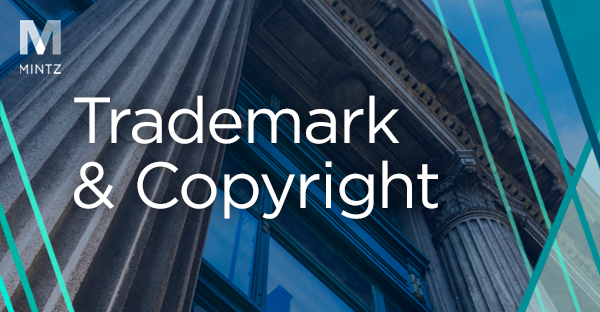
Intellectual Property
Viewpoints
Filter by:
U.S. Supreme Court Adopts Rule Protecting a Trademark Licensee’s Ability to Use a Trademark after a Bankrupt Licensor’s Rejection of the License
July 8, 2019 | Blog | By Susan Neuberger Weller, Alexander Roan, Tim McKeon
This past May, in a highly-anticipated decision, the Supreme Court held in Mission Product Holdings, Inc. v. Tempnology, LLC that a debtor’s rejection of an executory contract under Section 365 of the Bankruptcy Code has the same effect as a breach of contract outside of bankruptcy. The decision resolves an inter-circuit split on the effect of a bankrupt trademark licensor’s rejection of a trademark license, a question regarded by legal experts in the trademark community as the most significant unresolved legal issue in trademark licensing.
Read more
Effect of A Restriction Requirement on Prosecution History Estoppel
July 2, 2019 | Blog | By Christina Sperry
The decision whether to issue a Restriction Requirement during patent prosecution lies with the patent examiner, not the patent applicant. A Restriction Requirement can nevertheless trigger prosecution history estoppel that limits the scope of an applicant’s issued claim. The Federal Circuit’s recent decision in UCB, Inc. v. Watson Laboratories Inc. helps show how this situation can happen and how applicants can help prevent an examiner’s decision from adversely affecting patent scope.
Read more
One Size Does Not Fit All When It Comes to Economic Theories Used to Determine Royalty Rates
July 1, 2019 | Blog | By Michael Renaud, James Wodarski, Matthew Galica
Calculating royalty rates as part of a patent dispute often becomes a hotly-disputed issue, where opposing economic theories from expert witnesses are pinned against one another. As a litigant, care must be taken when deciding which economic theory to advance—and what facts to rely on—in support of a particular royalty rate. Given the varying and unique nature of disputes, a singular economic approach to determining a royalty rate is impractical and, oftentimes, inappropriate.
Read more
Federal Circuit Closes Another AIA Loophole
June 28, 2019 | Blog | By Michael Van Loy
The Federal Circuit recently ruled that state sovereign immunity does not apply in Inter Partes Review (IPR) proceedings, closing another America Invents Act (AIA) loophole. The case, Regents of the University of Minnesota v. LSI Corporation and Avago Technologies U.S. Inc. (Fed. Circ., 2018-1559), included the review of six Patent Trial and Appeal Board (PTAB) IPRs where the Regents of the University of Minnesota (UMN) filed motions to dismiss based on state sovereign immunity.
Read more
U.S. Supreme Court to Review Copyrightability of Privately-Produced Annotated State Statutory Compilations
June 28, 2019 | Blog | By Susan Neuberger Weller
Earlier this week, the Supreme Court granted the State of Georgia’s petition to review the Eleventh Circuit’s decision in Code Revision Comm'n v. Public.Resource.Org, Inc., 906 F.3d 1229 (11th Cir. 2018). In that case, the Eleventh Circuit held that the privately-compiled but officially-sanctioned and adopted Official Code of Georgia Annotated (OCGA) was not protected by copyright under the “government edicts” doctrine.
Read more
FUCT? You Heard That Right: Refusing to Register “Scandalous” and “Immoral” Trademarks is Unconstitutional
June 27, 2019 | Blog | By Susan Neuberger Weller
The U.S. Supreme Court, in a split decision, held that the federal ban on registering “scandalous” and “immoral” trademarks is an unconstitutional violation of free speech under the First Amendment of the US Constitution. The trademark FUCT is what was at issue in Iancu v. Brunetti, case number 18-302 (June 24, 2019). Although the mark had been in use on clothing for many years, it was never accepted for registration by the US Trademark Office on grounds that it violated the ban on registration of “scandalous” and “immoral” marks under Section 1052(a) of the Lanham Act.
Read more
District of Delaware Dismisses ANDA Applicant for Lack of Venue under TC Heartland and In re Cray
June 27, 2019 | Blog | By Joe Rutkowski
On June 17, 2019, the United States District Court for the District of Delaware, in Novartis Pharmaceuticals Corp. v. Accord Healthcare Inc., et al., No. 18-cv-01043, held that venue was not proper in Delaware over Mylan Pharmaceuticals Inc. (“MPI”) in connection with Novartis’s Hatch-Waxman patent infringement claim arising from MPI’s submission of an Abbreviated New Drug Application (“ANDA”) seeking approval to market a generic version of the drug, Gilenya® (fingolimod).
Read more
Supreme Court Declines to Address the Question of Article III Standing to Appeal a Final Written Decision from the PTAB
June 20, 2019 | Blog | By Daniel Weinger
This week, the Supreme Court left open the question of Article III standing with regards to appealing a final written decision from the Patent Trial and Appeals Board (“PTAB”) that is favorable to the patent owner. On Monday, the Supreme Court denied two petitions for certiorari that sought to appeal final written decisions (“FWD”) adverse to the petitioner in an inter partes review proceeding, in that the PTAB declines to cancel all claims under review.
Read more
Criminal Statute for Organized Crime Now Available to Combat Trade Secret Theft – But What is an Act of Trade Secret Theft under Civil RICO?
June 18, 2019 | Blog | By Michael Renaud, Nicholas Armington
The DTSA standing alone provides significant recourse for trade secret owners who have fallen victim to trade secret theft. Apart from the protection provided by the DTSA itself, however, the statute also allows trade secret owners to leverage the Racketeer Influence and Corrupt Organizations Act (RICO), a statute passed to address organized crime, to combat trade secret misappropriation. The DTSA does this by making trade secret theft qualify as a predicate act sufficient to show racketeering activity under RICO. This fairly new tool gives trade secret owners another potent option when confronting trade secret theft.
Read more
Understanding the USPTO’s Interpretation of 35 U.S.C. § 112 for Computer-Implemented Functional Claim Limitations
June 12, 2019 | Blog | By Christina Sperry
Patent practitioners, inventors, in-house counsel, and patent examiners alike have been clamoring for more guidance on computer-implemented functional claim limitations invoking § 112(f) since the Federal Circuit’s en banc Williamson v. Citrix decision in 2015. To help answer some of those pleas, the U.S. Patent and Trademark Office (USPTO) published a Federal Register notice on January 7, 2019 to address issues under 35 USC § 112.
Read more
Navigating the Legalization of Hemp under the 2018 Farm Bill Involves Changes to the Issuance of Federal Trademarks in the Cannabis Industry
June 11, 2019 | Blog | By Susan Neuberger Weller
Legalizing “hemp” under the Agricultural Improvement Act of 2018 (2018 Farm Bill) has triggered an important change for the examination of federal trademark applications concerning cannabis and cannabis-derived goods and services. In response to the Bill’s enactment on December 20, 2018, the United States Patent and Trademark Office (USPTO) issued a new examination guide to clarify its examination procedures involving hemp goods and services. For businesses in the cannabis industry, the examination guide (recently issued on May 2, 2019) will impact the viability of federal trademark applications filed on or after December 20, 2018 that were once previously barred.
Read more
Emerging Legal Trends AI: Can Israel Join the U.S. and Europe as a Leader in AI Protections?
June 10, 2019 | Blog | By Michael Renaud, Asa Kling, Marguerite McConihe
The intersection of artificial intelligence (AI) and intellectual property invokes fascinating theoretical questions. With these questions, however, come significant practical issues that businesses, legal practitioners, and governments need to address proactively. Israel is embracing the challenge.
Read more
Score This One in Favor of Standard-Essential Patent Owners: Recent Decision Makes Satisfying FRAND Obligations Easier
June 5, 2019 | Blog | By Michael Renaud, James Wodarski, Matthew Galica
A recent decision in the Eastern District of Texas should provide standard-essential patent (“SEP”) owners with more clarity and optimism when negotiating SEP licenses. Coming on the heels of Judge Koh’s decision in the FTC’s dispute with Qualcomm, Judge Gilstrap found Ericsson to have satisfied its fair, reasonable and non-discriminatory (“FRAND”) obligations when negotiating with HTC due in large part to a finding that it had negotiated in good faith.
Read more
The International Trade Commission Has Broad Jurisdictional Authority, Including Indirect Sellers
June 3, 2019 | Blog
On April 26, 2019, Administrative Law Judge (“ALJ”) Lord clearly stated in Certain Intraoral Scanner and Related Hardware and Software that the International Trade Commission’s (“ITC”) jurisdictional authority extends to accused infringers whose activities have “some nexus” to an element of section 337. ALJ Lord found that involvement in training and supporting resellers, distributors and end users in the infringing goods in the United States was sufficient to put that respondent under the broad reach of section 337, even if they did not import or directly sell the products.
Read more
Federal Circuit Affirms that the ITC Cannot Investigate an FDCA Violation without the FDA’s say-so
May 30, 2019 | Blog
In Amarin Pharma, Inc. v. Int’l Trade Comm’n (18-1247), the Federal Circuit affirmed the International Trade Commission’s (“ITC”) finding that Amarin’s false advertising claim under § 43(a) of the Lanham Act was precluded by the Federal Food, Drug, and Cosmetic Act (“FDCA”) because these claims require the FDA’s guidance on whether possible non-compliance of the provision is a violation of the FDCA. The court also found that the Commission may decline to institute an investigation where there is no cognizable claim under § 337.
Read more
Claim Construction of “Customary and Ordinary” Meaning Does Not Justify Amendment of Noninfringement and Invalidity Contentions
May 29, 2019 | Blog | By Andrew DeVoogd, Courtney Herndon
Recently, in a patent infringement action pending in the Eastern District of Michigan, Webasto Thermo & Comfort N. Am., Inc. v. BesTop, Inc., No. 2:16-cv-13456, Order No. 209 (E.D. Mich. May 20, 2019) (Borman, J.), the court overruled defendant BesTop’s objections to the Special Master’s recommendation to grant plaintiff, Webasto’s, motion to strike BesTop’s second amended noninfringement and invalidity contentions.
Read more
Performing a Service without Selling the Process Still Triggers the On-Sale Bar
May 24, 2019 | Blog | By Daniel Weinger, Will Perkins, Serge Subach
Services play a large role in today’s economy, and it is important to be mindful of how certain pitfalls that apply to product-based intellectual property rights also apply to method or process-based intellectual property (“IP”) rights. For example, the “on-sale bar” invalidates a patent on a product where a sale or offer to sell the product occurred more than a year prior to filing for a patent.
Read more
Another Shoe Drops in the Qualcomm Patent Licensing Saga
May 24, 2019 | Blog | By Michael Renaud, Bruce Sokler, Rich Gervase
Just when observers thought Qualcomm could celebrate its successful litigation with Apple another decision has come down which could have major implications for Qualcomm’s business going forward.
Read more
ITC ALJ McNamara in Apple-Qualcomm Investigation: Exclusion Orders Are Incentives to Design- Around
May 21, 2019 | Blog | By Michael Renaud, James Wodarski
In her April 16, 2019 Public Interest Findings, Administrative Law Judge (“ALJ”) McNamara decisively stated that antitrust issues disguised as competitive conditions arguments are not a factor in the International Trade Commission (“ITC”) proceeding between Apple and Qualcomm. See Mobile Electronic Devices II, Inv. No. 337-TA-1093, Analysis and Findings with Respect to the Public Interest, and Recommendation on Remedy and Bond, at 4 (April 16, 2019).
Read more
Director Iancu Roundtable with BIOCOM San Diego
May 20, 2019 | Blog | By Marc Morley, Melissa Brayman
Andrei Iancu, the Under Secretary of Commerce for Intellectual Property and Director of the USPTO, believes that the U.S. needs a strong patent system in order to excel and thrive in the global economy. He has made strengthening the U.S. patent system a core part of his mission responsibilities. Director Iancu has been travelling across the country and speaking with various patent stakeholders. As part of this effort, he met with BIOCOM’s Board of Directors and Intellectual Property Committee in San Diego on April 18, 2019.
Read more
Explore Other Viewpoints:
- Antitrust
- Appellate
- Arbitration, Mediation & Alternate Dispute Resolution
- Artificial Intelligence
- Awards
- Bankruptcy & Restructuring
- California Land Use
- Class Action
- Complex Commercial Litigation
- Construction
- Consumer Product Safety
- Cross-Border Asset Recovery
- Debt Financing
- Direct Investing (M&A)
- Diversity
- EB-5 Financing
- Education & Nonprofits
- Employment
- Energy & Sustainability
- Environmental Enforcement Defense
- Environmental Law
- FDA Regulatory
- Federal Circuit Appeals
- Financial Institution Litigation
- Government Law
- Growth Equity
- Health Care
- Health Care Compliance, Fraud and Abuse, & Regulatory Counseling
- Health Care Enforcement & Investigations
- Health Care Transactions
- Health Information Privacy & Security
- IP Due Diligence
- IPRs & Other Post Grant Proceedings
- Immigration
- Insolvency & Creditor Rights Litigation
- Institutional Investor Class Action Recovery
- Insurance & Financial Services
- Insurance Consulting & Risk Management
- Insurance and Reinsurance Problem-Solving & Dispute Resolution
- Intellectual Property
- Investment Funds
- Israel
- Licensing & Technology Transactions
- Life Sciences
- Litigation & Investigations
- M&A Litigation
- ML Strategies
- Medicare, Medicaid and Commercial Coverage & Reimbursement
- Mergers & Acquisitions
- Patent Litigation
- Patent Prosecution & Strategic Counseling
- Pharmacy Benefits and PBM Contracting
- Portfolio Companies
- Privacy & Cybersecurity
- Private Client
- Private Equity
- Pro Bono
- Products Liability & Complex Tort
- Projects & Infrastructure
- Public Finance
- Real Estate Litigation
- Real Estate Transactions
- Real Estate, Construction & Infrastructure
- Retail & Consumer Products
- Securities & Capital Markets
- Securities Litigation
- Special Purpose Acquisition Company (SPACs)
- Sports & Entertainment
- Strategic IP Monetization & Licensing
- Tax
- Technology
- Technology, Communications & Media
- Technology, Communications & Media Litigation
- Trade Secrets
- Trademark & Copyright
- Trademark Litigation
- Venture Capital & Emerging Companies
- White Collar Defense & Government Investigations
- Women's Health and Technology









